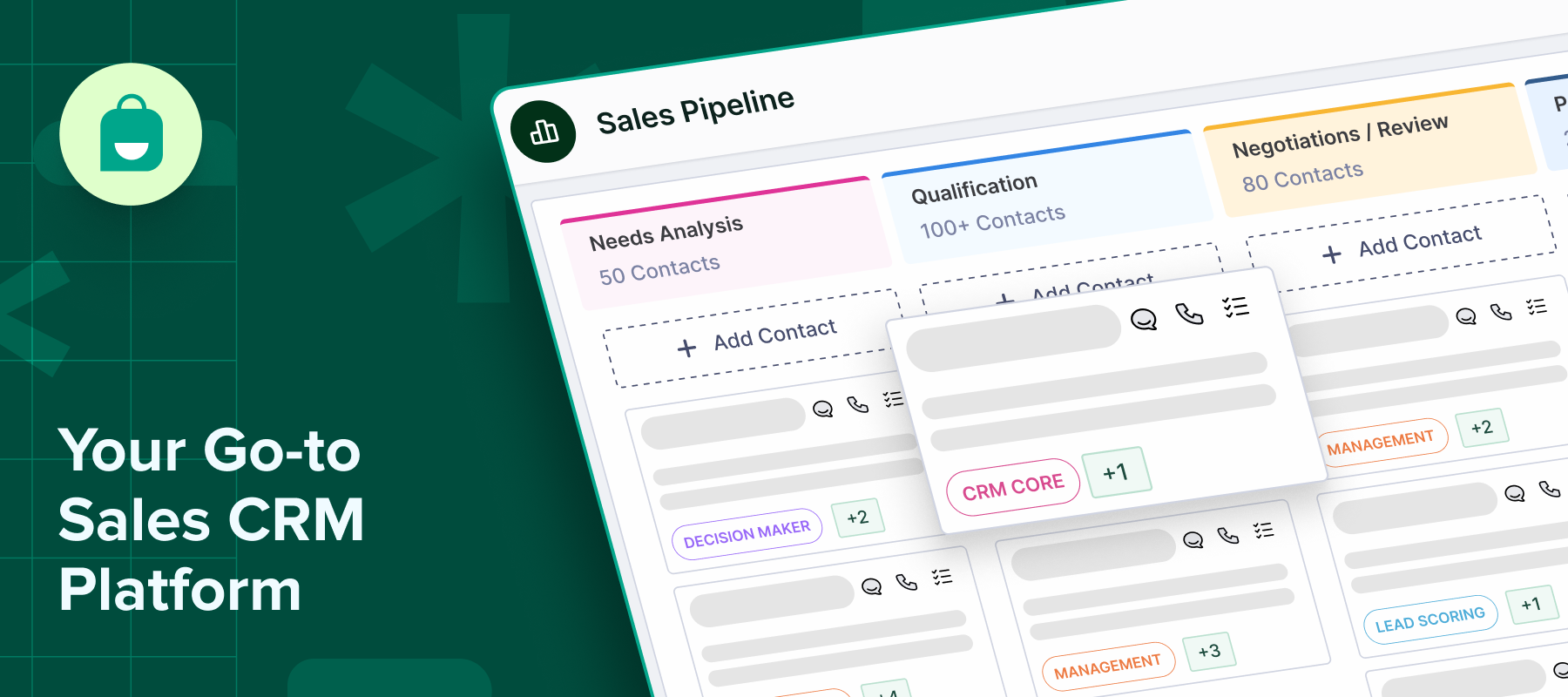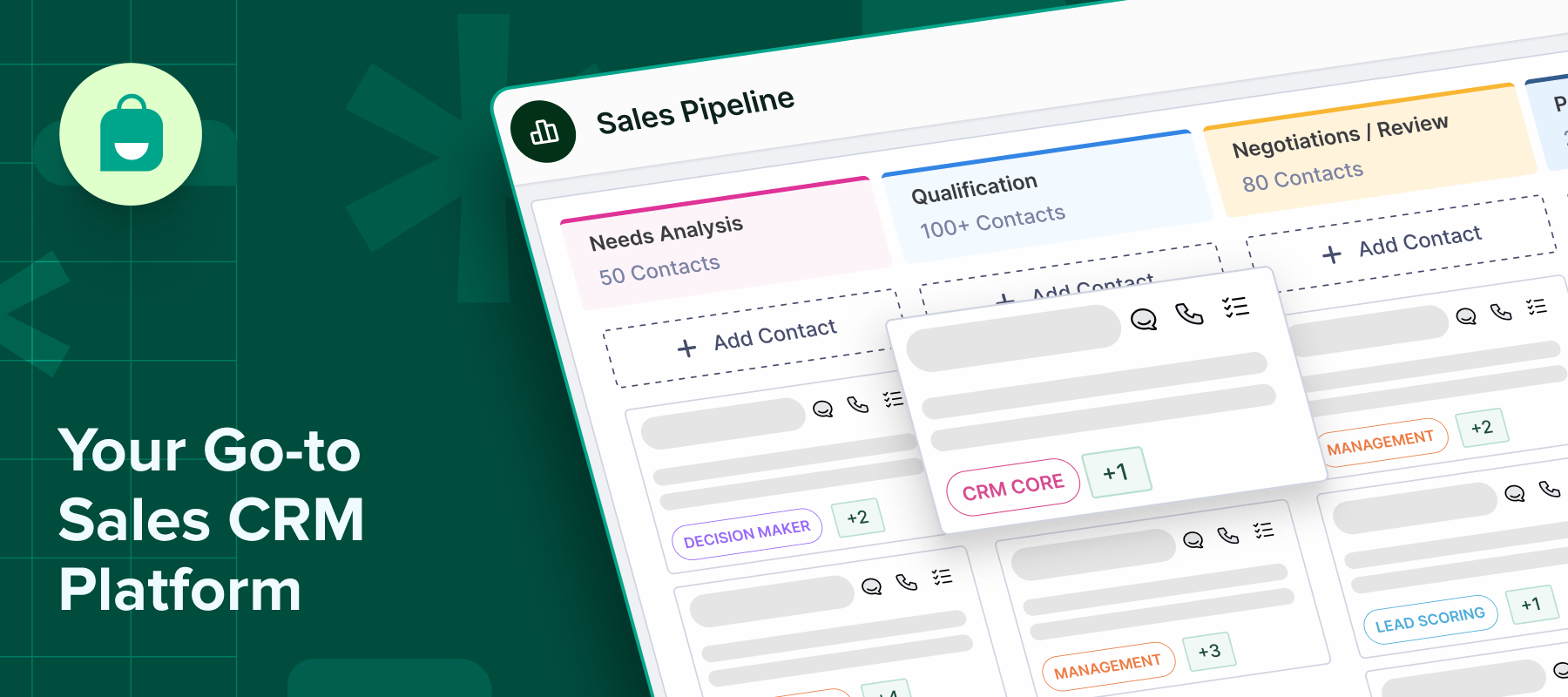A well-chosen Sales CRM can simplify your workflows, enhance customer engagement, and boost revenue. In this blog, we’ll walk you through how to choose the right sales CRM for your product-based business. From must-have features to benefits and selection tips, we’ll cover everything you need—whether you’re an SMB, B2B brand, or SaaS company.
Sales CRM and Its Importance
CRM systems are designed to manage a company’s interactions with current and potential customers. They help businesses organize, automate, and synchronize sales, marketing, customer service, and technical support. For product-based businesses, a sales CRM is particularly vital as it ensures every customer touchpoint is optimized for conversion and retention.
Ways to Use Sales CRM for Product-Based Businesses
A Sales CRM isn’t just for service providers it’s a game-changer for product-based businesses too. Here are some practical ways you can make the most of it:
1. Track Leads from Multiple Channels
Whether it’s through your website, WhatsApp, social media, or offline events – a CRM helps you capture and manage leads from all sources in one place.
2. Manage Inventory-Linked Sales Pipelines
Product-based businesses often deal with inventory. A CRM can integrate with your inventory system to ensure you’re selling what’s actually in stock, reducing delays and miscommunication.
3. Automate Follow-Ups and Reminders
Use automation to send timely reminders and follow-up messages to prospects who haven’t yet converted. This keeps your sales cycle active without manual effort.
4. Segment Customers for Personalized Offers
With CRM data, you can segment your customers based on past purchases, location, or interest—and send them highly personalized WhatsApp or email offers.
5. Measure Sales Team Performance
Track which team members are closing deals, how long deals stay in the pipeline, and where leads drop off. Use this data to train and improve your sales team.
Key Features to Look for in a Sales CRM
When selecting the best sales CRM software for your business, consider these essential features:
– Contact Management: Efficiently stores and organizes customer information.
– Sales Automation: Automates repetitive tasks, allowing sales teams to focus on closing deals.
– Pipeline Management in Sales CRM: Visualizes the sales process, helping teams track progress and identify bottlenecks.
– Reporting and Analytics: Provides insights into sales performance and customer behavior.
– Integration Capabilities: Seamlessly connects with existing tools and platforms.
Tips for Choosing the Right Sales CRM for Product-Based Businesses
Not every CRM fits the unique needs of a product-based business. Here’s how to pick the right one:
1. Look for Inventory or E-commerce Integration
Choose a CRM that integrates with your inventory system, online store (like Shopify or WooCommerce), or ERP to ensure smooth order processing.
2. Prioritize Multi-Channel Lead Capture
Ensure the CRM can pull leads from WhatsApp, forms, landing pages, and offline channels—so you never miss a potential sale.
3. Evaluate Automation Features
Look for workflows that can automate follow-ups, status updates, or payment reminders—this is key to reducing manual work.
4. Check for WhatsApp or Messaging Capabilities
In today’s commerce landscape, real-time messaging matters. Pick a CRM that lets you communicate via WhatsApp for instant engagement.
5. Consider Customizability & Scalability
As your product catalog and customer base grow, your CRM should scale too. Choose a system that’s flexible and can evolve with your business.
Why Sales CRM is Essential for Product Based Businesses
Product-based businesses face unique challenges that a robust CRM can help address. From managing large inventories to handling complex customer interactions, the right CRM can transform these challenges into opportunities for growth.
– Boosting Efficiency and Productivity
With sales CRM software for SMBs, businesses can automate routine tasks, allowing sales teams to focus on more strategic activities. This not only increases efficiency but also enhances productivity, leading to better sales outcomes.
– Enhancing Customer Relationships
Maintaining strong customer relationships is critical for any product-based business. Sales CRM software for B2B companies provides tools to personalize interactions and improve customer satisfaction, ultimately fostering loyalty and repeat business.
Top 4 Sales CRM for Product-Based Businesses
Choosing the right CRM can make or break your sales process—especially when you’re dealing with product inventory, order tracking, and high customer volumes. Here are the top CRMs tailored for product-based businesses:
1. Interakt – Best WhatsApp-First CRM for Product Sellers
Interakt is a powerhouse for D2C brands and SMBs that rely on WhatsApp to drive sales. From catalog sharing and cart recovery to lead management and automation, Interakt turns conversations into conversions.
Why choose Interakt:
-WhatsApp Business API integration
-Shared team inbox + smart automation
-Product catalog sharing & real-time order updates
-Affordable pricing made for SMBs
2. Zoho CRM – Customizable CRM for Growing Teams
Zoho offers a flexible CRM with features like lead scoring, workflow automation, and multichannel support. It’s ideal for businesses that need custom modules and third-party integrations.
3. HubSpot CRM – User-Friendly with Marketing Add-ons
HubSpot’s free CRM is a great starting point for small businesses. It provides a clean interface with pipeline tracking, email integration, and marketing tools.
4. Salesforce – Enterprise-Grade CRM
Salesforce is a robust solution for large product-based businesses with complex sales cycles. It offers deep customization, AI-powered insights, and advanced reporting—but at a higher cost.
💡TL;DR: If your customers are on WhatsApp, Interakt is the clear winner—purpose-built for product-based sales, it helps you sell smarter, faster, and more personally. For multichannel or enterprise needs, tools like Zoho, HubSpot, or Salesforce can step in.
Optimizing B2B Growth with CRM
For businesses focused on B2B growth, CRM systems offer advanced analytics and reporting tools. These features provide valuable insights into sales trends, helping businesses adjust strategies for better results.
Sales CRM for B2B growth is about more than just managing contacts; it’s about understanding complex sales cycles and leveraging data to drive business decisions.
Conclusion
In conclusion, selecting the right sales CRM for product based business is a strategic decision that can significantly impact your sales performance and customer satisfaction. Whether you’re a small startup or a large enterprise, investing in the best sales CRM software tailored to your specific needs can lead to sustainable growth and success. Start by evaluating your business needs, exploring various CRM options, and integrating the system that aligns best with your goals. For personalized advice and CRM recommendations, contact our team of experts today!







